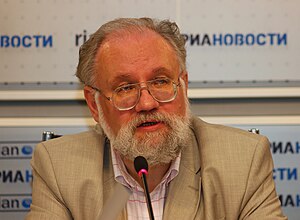Vladimir Churov
| Vladimir Churov | |
|---|---|
 |
|
| Chairman of the Central Election Commission of Russia | |
|
In office 27 March 2007 – 27 March 2016 |
|
| Preceded by | Alexander Veshnyakov |
| Succeeded by | Ella Pamfilova |
| Personal details | |
| Born |
Vladimir Yevgenyevich Churov 17 March 1953 Leningrad, Russian SSR, USSR |
| Nationality | Russian |
Vladimir Yevgenyevich Churov (Russian: Владимир Евгеньевич Чуров; born March 17, 1953, in Leningrad, Soviet Union) is a Russian official and politician. Since March 26, 2007, he has been a member (delegated by the State Duma) and the Chairman of the Central Election Commission of Russia.
In 1977 he graduated from the Department of Physics at Leningrad State University.
In 1992–2003 he worked on the Committee for External Relations of the Saint Petersburg Mayor's Office, in 1992–1996 under Vladimir Putin, in 1995–2003 as a deputy head of the Committee. According to Marina Salye, Churov worked for KGB.
In December 2003 – March 2007 he was a deputy in the State Duma (of LDPR faction).
On January 30, 2007, amendments to the Russian election legislation, which would allow people without a law degree to become members of the Central Election Commission, were passed by the President of Russia. This enabled Churov to be elected to the Commission.
From the beginning, Churov created an image of a person who would remain loyal to president Putin under any circumstances. During his tenure, he made a number of controversial statements, which were interpreted as his willingness to rubber-stamp election results favorable to Putin even if there were reports of widespread violations. Participation of independent observers was made considerably more complicated. In the Russian legislative election, 2011, Churov maintained that the elections were free of falsifications, although the media reported a number of instances when the data of Central Election Commission of Russia differed with the protocols of election districts. One of the demands during the 2011–13 Russian protests was the resignation of Churov. On the other hand, the Central Electoral Committee did not falsify the results itself, and Churov was even instrumental in creating the efficient appeal system, which helped to strike down some decisions of lower level electoral committees.
...
Wikipedia
